Cleaved-Caspase-3 p17 (D175) Polyclonal Antibody
- Catalog No.:YC0006
- Applications:WB;IF;IHC;ELISA
- Reactivity:Human;Mouse;Rat
- Target:
- Caspase-3
- Fields:
- >>Platinum drug resistance;>>MAPK signaling pathway;>>p53 signaling pathway;>>Apoptosis;>>Apoptosis - multiple species;>>Natural killer cell mediated cytotoxicity;>>IL-17 signaling pathway;>>TNF signaling pathway;>>Serotonergic synapse;>>Non-alcoholic fatty liver disease;>>AGE-RAGE signaling pathway in diabetic complications;>>Alcoholic liver disease;>>Alzheimer disease;>>Parkinson disease;>>Amyotrophic lateral sclerosis;>>Huntington disease;>>Prion disease;>>Pathways of neurodegeneration - multiple diseases;>>Epithelial cell signaling in Helicobacter pylori infection;>>Pathogenic Escherichia coli infection;>>Salmonella infection;>>Pertussis;>>Legionellosis;>>Toxoplasmosis;>>Amoebiasis;>>Tuberculosis;>>Hepatitis C;>>Hepatitis B;>>Measles;>>Human cytomegalovirus infection;>>Influenza A;>>Human papillomavirus infection;>>Kaposi sarcoma-associated herpesvirus infection;>>Herpes simplex virus 1 infection;>>Epstein-Barr virus infection;>>Human immunodeficiency virus 1 infection;>>Pathways i
- Gene Name:
- CASP3
- Protein Name:
- Caspase3
- Human Gene Id:
- 836
- Human Swiss Prot No:
- P42574
- Mouse Gene Id:
- 12367
- Mouse Swiss Prot No:
- P70677
- Rat Gene Id:
- 25402
- Rat Swiss Prot No:
- P55213
- Immunogen:
- The antiserum was produced against synthesized peptide derived from human Caspase 3. AA range:126-175
- Specificity:
- Cleaved-Caspase-3 p17 (D175) Polyclonal Antibody detects endogenous levels of fragment of activated Caspase-3 p17 protein resulting from cleavage adjacent to D175.
- Formulation:
- Liquid in PBS containing 50% glycerol, 0.5% BSA and 0.02% sodium azide.
- Source:
- Polyclonal, Rabbit,IgG
- Dilution:
- WB 1:500-2000, IHC 1:50-300, IF 1:50-300
- Purification:
- The antibody was affinity-purified from rabbit antiserum by affinity-chromatography using epitope-specific immunogen.
- Concentration:
- 1 mg/ml
- Storage Stability:
- -15°C to -25°C/1 year(Do not lower than -25°C)
- Other Name:
- CASP3;CPP32;Caspase-3;CASP-3;Apopain;Cysteine protease CPP32;CPP-32;Protein Yama;SREBP cleavage activity 1;SCA-1
- Observed Band(KD):
- 17 34kD
- Background:
- This gene encodes a protein which is a member of the cysteine-aspartic acid protease (caspase) family. Sequential activation of caspases plays a central role in the execution-phase of cell apoptosis. Caspases exist as inactive proenzymes which undergo proteolytic processing at conserved aspartic residues to produce two subunits, large and small, that dimerize to form the active enzyme. This protein cleaves and activates caspases 6, 7 and 9, and the protein itself is processed by caspases 8, 9 and 10. It is the predominant caspase involved in the cleavage of amyloid-beta 4A precursor protein, which is associated with neuronal death in Alzheimer's disease. Alternative splicing of this gene results in two transcript variants that encode the same protein. [provided by RefSeq, Jul 2008],
- Function:
- catalytic activity:Strict requirement for an Asp residue at positions P1 and P4. It has a preferred cleavage sequence of Asp-Xaa-Xaa-Asp-|- with a hydrophobic amino-acid residue at P2 and a hydrophilic amino-acid residue at P3, although Val or Ala are also accepted at this position.,enzyme regulation:Inhibited by isatin sulfonamides.,function:Involved in the activation cascade of caspases responsible for apoptosis execution. At the onset of apoptosis it proteolytically cleaves poly(ADP-ribose) polymerase (PARP) at a '216-Asp-|-Gly-217' bond. Cleaves and activates sterol regulatory element binding proteins (SREBPs) between the basic helix-loop-helix leucine zipper domain and the membrane attachment domain. Cleaves and activates caspase-6, -7 and -9. Involved in the cleavage of huntingtin.,PTM:Cleavage by granzyme B, caspase-6, caspase-8 and caspase-10 generates the two active subunits. Ad
- Subcellular Location:
- Cytoplasm.
- Expression:
- Highly expressed in lung, spleen, heart, liver and kidney. Moderate levels in brain and skeletal muscle, and low in testis. Also found in many cell lines, highest expression in cells of the immune system.
Decreased thioredoxin reductase 3 expression promotes nickel-induced damage to cardiac tissue via activating oxidative stress-induced apoptosis and inflammation
Terbinafine prevents colorectal cancer growth by inducing dNTP starvation and reducing immune suppression WB Human 1:1000 /HCT116, HT-29 cells
Periostin promotes nucleus pulposus cells apoptosis by activating the Wnt/β-catenin signaling pathway WB,IHC Human,Rat 1:2000 disc specimens/NPCs
Licoflavone A Suppresses Gastric Cancer Growth and Metastasis by Blocking the VEGFR-2 Signaling Pathway. Journal of Oncology2022;2022:5497991. Human 1 : 1000 MKN-45 cell
An Integrated Approach Based on Network Analysis Combined With Experimental Verification Reveals PI3K/Akt/Nrf2 Signaling Is an Important Way for the Anti-Myocardial Ischemia Activity of Yi-Qi-Tong-Luo Capsule. Front Pharmacol. 2022 Feb;13:794528-794528. WB,IF Rat 1:1000
Tuning Cell Autophagy by Diversifying Carbon Nanotube Surface Chemistry. ACS Nano 2014 Feb 25 WB Human HEK293 cell
The isolation of an RNA aptamer targeting to p53 protein with single amino acid mutation. PROCEEDINGS OF THE NATIONAL ACADEMY OF SCIENCES OF THE UNITED STATES OF AMERICA P Natl Acad Sci Usa. 2015 Aug;112(32):10002-10007 WB Human H1299 cell
MiR-629-5p Promotes Prostate Cancer Development and Metastasis by Targeting AKAP13. Frontiers in Oncology Front Oncol. 2021; 11: 754353 WB Human LNCaP cell, PC3 cell,C4-2 cell
Enhanced autophagy reveals vulnerability of P-gp mediated epirubicin resistance in triple negative breast cancer cells. APOPTOSIS Apoptosis. 2016 Apr;21(4):473-488 WB Human MDA-MB-231 cell
PM2.5 induces autophagy-mediated cell death via NOS2 signaling in human bronchial epithelium cells. International Journal of Biological Sciences Int J Biol Sci. 2018; 14(5): 557–564 WB Human BEASE-2B cell
Suppression of CDCA3 inhibits prostate cancer progression via NF‑κB/cyclin D1 signaling inactivation and p21 accumulation. ONCOLOGY REPORTS Oncol Rep. 2022 Feb;47(2):1-10 WB Human 1:1000 Prostate cancer tissue,paracancerous tissue.
The induction of apoptosis and autophagy in human hepatoma SMMC-7721 cells by combined treatment with vitamin C and polysaccharides extracted from Grifola frondosa. APOPTOSIS 2017 Sep 11 WB Human SMMC-7721 cell
The ATRQβ-001 vaccine improves cardiac function and prevents postinfarction cardiac remodeling in mice. HYPERTENSION RESEARCH Hypertens Res. 2018 Dec;42(3):329-340 WB Mouse heart tissues
ICT1 Promotes Osteosarcoma Cell Proliferation and Inhibits Apoptosis via STAT3/BCL-2 Pathway. Biomed Research International Biomed Res Int. 2021;2021:8971728 WB Human U-2OS cell, 143B cell
Recombinant Newcastle disease virus (rL-RVG) triggers autophagy and apoptosis in gastric carcinoma cells by inducing ER stress. American Journal of Cancer Research Am J Cancer Res. 2016; 6(5): 924–936 WB Human SGC-7901 cell, HGC cell
Microcystin-LR Induced Apoptosis in Rat Sertoli Cells via the Mitochondrial Caspase-Dependent Pathway: Role of Reactive Oxygen Species. Frontiers in Physiology 2016 Sep 09 WB Rat Sertoli cell
LaSota Strain Expressing The Rabies Virus Glycoprotein (rL-RVG) Suppresses Gastric Cancer by Inhibiting the Alpha 7 Nicotinic Acetylcholine Receptor (α7 nAChR)/Phosphoinositide 3-Kinase (PI3K)/AKT Pathway. MEDICAL SCIENCE MONITOR Med Sci Monitor. 2019; 25: 5482–5492 WB Human SGC cell, HGC cell
Total Flavonoids from Carya cathayensis Sarg. Leaves Alleviate H9c2 Cells Hypoxia/Reoxygenation Injury via Effects on miR-21 Expression, PTEN/Akt, and the Bcl-2/Bax Pathway. Evidence-based Complementary and Alternative Medicine Evid-Based Compl Alt. 2018;2018:8617314 WB Rat 1:1000 H9c2 cell
Metabolites profiling and pharmacokinetics of troxipide and its pharmacodynamics in rats with gastric ulcer. Scientific Reports Sci Rep-Uk. 2020 Aug;10(1):1-21 IHC Rat Stomach
Protective effect of luteolin on cigarette smoke extract‑induced cellular toxicity and apoptosis in normal human bronchial epithelial cells via the Nrf2 pathway. ONCOLOGY REPORTS Oncol Rep. 2014 Apr;31(4):1855-1862 WB Human NHBE cell
Photo-excitable hybrid nanocomposites for image-guided photo/TRAIL synergistic cancer therapy. BIOMATERIALS Biomaterials. 2018 Sep;176:60 WB Human A549 cell
He-Wei granules (HWKL) combat cisplatin-induced nephrotoxicity and myelosuppression in rats by inhibiting oxidative stress, inflammatory cytokines and apoptosis. RSC Advances Rsc Adv. 2017 Mar;7(32):19794-19807 WB Rat kidney
Genetically engineered Newcastle disease virus expressing human interferon-λ1 induces apoptosis in gastric adenocarcinoma cells and modulates the Th1/Th2 immune response. ONCOLOGY REPORTS Oncol Rep. 2016 Sep;36(3):1393-1402 WB Human SGC cell, AGS cell
Down-regulation of FoxM1 by thiostrepton or small interfering RNA inhibits proliferation, transformation ability and angiogenesis, and induces apoptosis of nasopharyngeal carcinoma cells. International Journal of Clinical and Experimental Pathology Int J Clin Exp Patho. 2014; 7(9): 5450–5460 WB Human Nasopharyngeal carcinoma (NPC) cell
Coptisine Induces Apoptosis in Human Hepatoma Cells Through Activating 67-kDa Laminin Receptor/cGMP Signaling. Frontiers in Pharmacology 2018 May 18 WB,IHC Human 1:500,1:500 SMMC7721 cell, HepG2 Cell
Long noncoding RNA LINC00152 promotes cell proliferation through competitively binding endogenous miR‐125b with MCL‐1 by regulating mitochondrial apoptosis pathways in ovarian cancer. Cancer Medicine Cancer Med-Us. 2018 Sep;7(9):4530-4541 WB Human,Mouse xenograft SKOV3 cell, A2780 cell
Glutamine ameliorates intestinal ischemia-reperfusion Injury in rats by activating the Nrf2/Are signaling pathway. International Journal of Clinical and Experimental Pathology Int J Clin Exp Patho. 2015; 8(7): 7896–7904 IHC Rat 1:100 intestinal
Zhang, Hong, et al. "Therapeutic potential of bixin in PM2. 5 particles-induced lung injury in an Nrf2-dependent manner." Free Radical Biology and Medicine 126 (2018): 166-176.
Pan, Xiaohui, et al. "ICT1 Knockdown inhibits osteosarcoma cell proliferation by regulating cell apoptosis through targeting BCL-2." (2020).
Coptisine Induces Apoptosis in Human Hepatoma Cells Through Activating 67-kDa Laminin Receptor/cGMP Signaling. Frontiers in Pharmacology 2018 May 18 WB Human 1:500 SMMC7721 cell, HepG2 Cell
Promotion of tumor progression induced by continuous low-dose administration of antineoplastic agent gemcitabine or gemcitabine combined with cisplatin LIFE SCIENCES Weiyi Feng WB Human
Gabapentin Alleviates Brain Injury in Intracerebral Hemorrhage Through Suppressing Neuroinflammation and Apoptosis NEUROCHEMICAL RESEARCH Zongmao Zhao WB Rat
Postsurgical wound management and prevention of triple-negative breast cancer recurrence with a pryoptosis-inducing, photopolymerizable hydrogel JOURNAL OF CONTROLLED RELEASE Sanjun Shi WB Mouse 4 T1 cell
Apoptotic vesicles resist oxidative damage in noise-induced hearing loss through activation of FOXO3a-SOD2 pathway Stem Cell Research & Therapy Haidi Yang WB Human Mesenchymal stem cell (MSC),apoptotic vesicles (apoVs)
Inhibition of Nur77 expression and translocation by compound B6 reduces ER stress and alleviates cigarette smoke-induced inflammation and injury in bronchial epithelial cells. Yang Ting WB Human 1:1000 16-HBE cell
Comparison of two kinds of Agrocybe cylindracea polysaccharides: structural characteristic and antitumor activity. An-jun Liu WB Human MGC-803 cell
Adropin attenuates pancreatitis‑associated lung injury through PPARγ phosphorylation‑related macrophage polarization. INTERNATIONAL JOURNAL OF MOLECULAR MEDICINE Shangeng Weng WB Mouse 1:1000 lung tissue
Role of Txnrd3 in NiCl2-induced kidney cell apoptosis in mice: Potential therapeutic effect of melatonin. ECOTOXICOLOGY AND ENVIRONMENTAL SAFETY Ziwei Zhang WB Mouse 1:1000 kidney
Apigenin-induced Apoptosis is Reduced via Endoplasmic Reticulum Stress and ATF6/PERK Signaling in Human Gastric Cancer Cells. Pharmacognosy Magazine Liying Hou WB Human SGC-7901 Cell
hPMSCs Regulate the Level of TNF-α and IL-10 in Th1 Cells and Improve Hepatic Injury in a GVHD Mouse Model via CD73/ADO/Fyn/Nrf2 Axis. INFLAMMATION Luan Xiying IF Human human placental-derived MSCs (hPMSCs)
Toxoplasma gondii infection regulates apoptosis of host cells via miR-185/ARAF axis. Parasites & Vectors Jianping Tao WB Pig 1:1000 PK-15 cell,3D4/21 cell
The role of vitamin D through SphK1/S1P in the regulation of MS progression JOURNAL OF STEROID BIOCHEMISTRY AND MOLECULAR BIOLOGY Zhen Wang WB Rat PC12 cell
Human umbilical cord-derived mesenchymal stem cells ameliorate liver fibrosis by improving mitochondrial function via Slc25a47-Sirt3 signaling pathway BIOMEDICINE & PHARMACOTHERAPY Ping Chen WB Mouse 1:1000 liver tissue AML-12 cell
Roflupram alleviates autophagy defects and reduces mutant hSOD1-induced motor neuron damage in cell and mouse models of amyotrophic lateral sclerosis NEUROPHARMACOLOGY Di Huo WB Mouse 1:500 spinal cord tissue NSC34 cell
Rosmarinic acid mitigates acrylamide induced neurotoxicity via suppressing endoplasmic reticulum stress and inflammation in mouse hippocampus PHYTOMEDICINE Tian-Bao Wang IHC,WB Mouse hippocampal
The gut microbiota contributes to the infection of bovine viral diarrhea virus in mice JOURNAL OF VIROLOGY Zecai Zhang WB Mouse peripheral blood lymphocytes (PBL)
TREM2 Alleviates Subarachnoid Hemorrhage-Induced Brain Injury through Attenuating Neuroinflammation and Programmed Cell Death in Vivo and in Vitro Frontiers in Bioscience-Landmark Jiaqiang Liu WB Mouse 1:1000 Temporal cortical tissue HT22 cell
A novel multifunctional microneedle patch for synergistic photothermal- gas therapy against maxillofacial malignant melanoma and associated skin defects JOURNAL OF NANOBIOTECHNOLOGY Shaojie Dong WB Mouse 1:2000 novel multifunctional sodium nitroprusside and Fe2+ ions loaded microneedles (SNP-Fe@MNs)
Pasteurella multocida activates apoptosis via the FAK-AKT-FOXO1 axis to cause pulmonary integrity loss, bacteremia, and eventually a cytokine storm VETERINARY RESEARCH Zhao Guangfu WB Mouse Lung tissue
Buqi Huoxue Tongnao prescription protects against chronic cerebral hypoperfusion via regulating PI3K/AKT and LXRα/CYP7A1 signaling pathways PHYTOMEDICINE Yinhuang Gao IHC Rat 1:200 cortex tissue,hippocampus tissue
S100A6 Regulates nucleus pulposus cell apoptosis via Wnt/β-catenin signaling pathway: an in vitro and in vivo study MOLECULAR MEDICINE Yang Fengguang WB Human,Rat 1:2000 human nucleus pulposus (NP) tissue,tail vertebrae tissue human nucleus pulposus (NP) cell (NPC)
Hepcidin depending on astrocytic NEO1 ameliorates blood-brain barrier dysfunction after subarachnoid hemorrhage Cell Death & Disease Wei Boyang WB Mouse 1:1000 Mouse brain microvascular endothelial cell (MBMEC)
- June 19-2018
- WESTERN IMMUNOBLOTTING PROTOCOL
- June 19-2018
- IMMUNOHISTOCHEMISTRY-PARAFFIN PROTOCOL
- June 19-2018
- IMMUNOFLUORESCENCE PROTOCOL
- September 08-2020
- FLOW-CYTOMEYRT-PROTOCOL
- May 20-2022
- Cell-Based ELISA│解您多样本WB检测之困扰
- July 13-2018
- CELL-BASED-ELISA-PROTOCOL-FOR-ACETYL-PROTEIN
- July 13-2018
- CELL-BASED-ELISA-PROTOCOL-FOR-PHOSPHO-PROTEIN
- July 13-2018
- Antibody-FAQs
- Products Images

- Postsurgical wound management and prevention of triple-negative breast cancer recurrence with a pryoptosis-inducing, photopolymerizable hydrogel JOURNAL OF CONTROLLED RELEASE Sanjun Shi WB Mouse 4 T1 cell
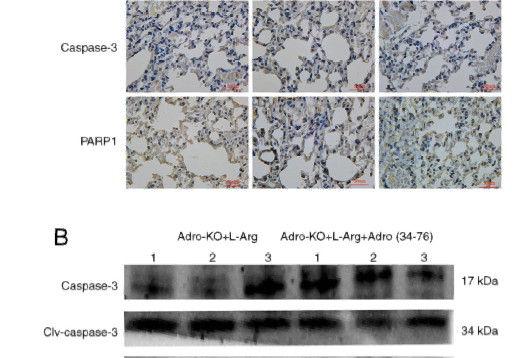
- Adropin attenuates pancreatitis‑associated lung injury through PPARγ phosphorylation‑related macrophage polarization. INTERNATIONAL JOURNAL OF MOLECULAR MEDICINE Shangeng Weng WB Mouse 1:1000 lung tissue
.jpg)
- Guo, H., Chen, B., Yan, Z. et al. Metabolites profiling and pharmacokinetics of troxipide and its pharmacodynamics in rats with gastric ulcer. Sci Rep 10, 13619 (2020).
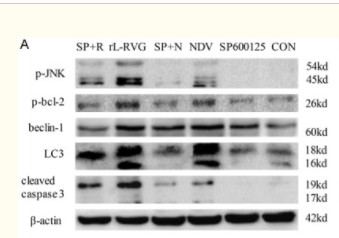
- Bu, Xuefeng, et al. "Recombinant Newcastle disease virus (rL-RVG) triggers autophagy and apoptosis in gastric carcinoma cells by inducing ER stress." American journal of cancer research 6.5 (2016): 924.
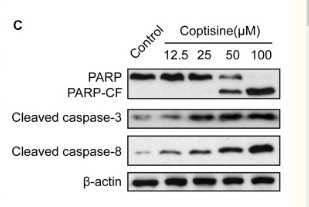
- Zhou, Li, et al. "Coptisine induces apoptosis in human hepatoma cells through activating 67-kDa laminin receptor/cGMP signaling." Frontiers in pharmacology 9 (2018).
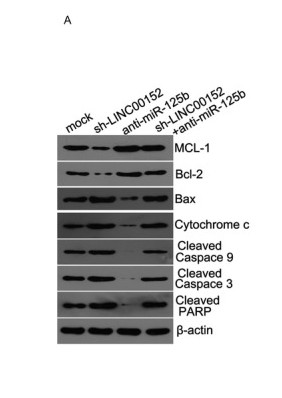
- Chen, Puxiang, et al. "Long noncoding RNA LINC00152 promotes cell proliferation through competitively binding endogenous miR‐125b with MCL‐1 by regulating mitochondrial apoptosis pathways in ovarian cancer." Cancer medicine 7.9 (2018): 4530-4541.

- Jiang, Ruibin, et al. "Total Flavonoids from Carya cathayensis Sarg. Leaves Alleviate H9c2 Cells Hypoxia/Reoxygenation Injury via Effects on miR-21 Expression, PTEN/Akt, and the Bcl-2/Bax Pathway." Evidence-Based Complementary and Alternative Medicine 2018 (2018).
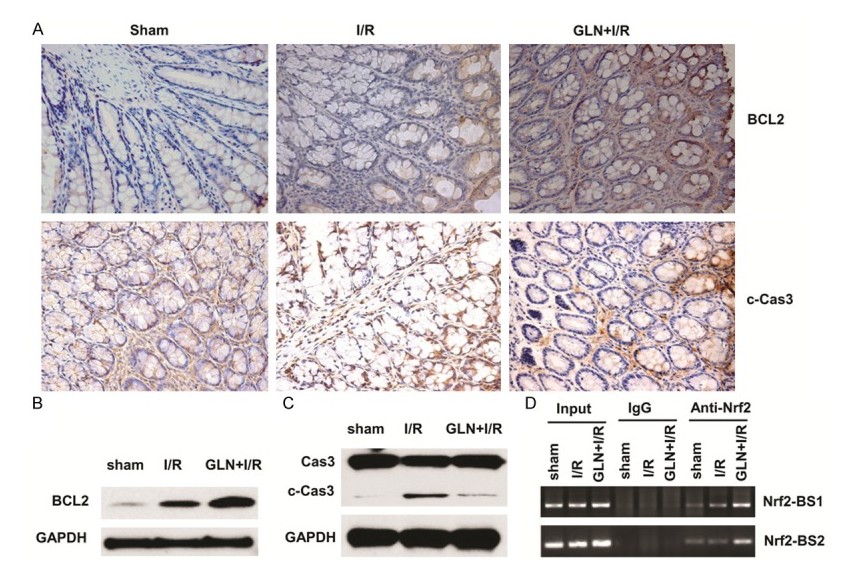
- Wang, Ai-Li, et al. "Glutamine ameliorates intestinal ischemia-reperfusion Injury in rats by activating the Nrf2/Are signaling pathway." International journal of clinical and experimental pathology 8.7 (2015): 7896.

- Western Blot analysis of various cells using primary antibody diluted at 1:1000(4°C overnight). Secondary antibody:Goat Anti-rabbit IgG IRDye 800( diluted at 1:5000, 25°C, 1 hour). Cell lysate was extracted by Minute™ Plasma Membrane Protein Isolation and Cell Fractionation Kit(SM-005, Inventbiotech,MN,USA).
poly-ihc-human-colon.jpg)
- Immunohistochemical analysis of paraffin-embedded Human-colon tissue. 1,Cleaved-Caspase-3 p17 (D175) Polyclonal Antibody was diluted at 1:200(4°C,overnight). 2, Sodium citrate pH 6.0 was used for antibody retrieval(>98°C,20min). 3,Secondary antibody was diluted at 1:200(room tempeRature, 30min). Negative control was used by secondary antibody only.
poly-ihc-human-lung.jpg)
- Immunohistochemical analysis of paraffin-embedded Human-lung tissue. 1,Cleaved-Caspase-3 p17 (D175) Polyclonal Antibody was diluted at 1:200(4°C,overnight). 2, Sodium citrate pH 6.0 was used for antibody retrieval(>98°C,20min). 3,Secondary antibody was diluted at 1:200(room tempeRature, 30min). Negative control was used by secondary antibody only.
poly-ihc-human-stomach.jpg)
- Immunohistochemical analysis of paraffin-embedded Human-stomach tissue. 1,Cleaved-Caspase-3 p17 (D175) Polyclonal Antibody was diluted at 1:200(4°C,overnight). 2, Sodium citrate pH 6.0 was used for antibody retrieval(>98°C,20min). 3,Secondary antibody was diluted at 1:200(room tempeRature, 30min). Negative control was used by secondary antibody only.
poly-ihc-human-stomach-cancer.jpg)
- Immunohistochemical analysis of paraffin-embedded Human-stomach-cancer tissue. 1,Cleaved-Caspase-3 p17 (D175) Polyclonal Antibody was diluted at 1:200(4°C,overnight). 2, Sodium citrate pH 6.0 was used for antibody retrieval(>98°C,20min). 3,Secondary antibody was diluted at 1:200(room tempeRature, 30min). Negative control was used by secondary antibody only.
poly-ihc-rat-heart.jpg)
- Immunohistochemical analysis of paraffin-embedded Rat-heart tissue. 1,Cleaved-Caspase-3 p17 (D175) Polyclonal Antibody was diluted at 1:200(4°C,overnight). 2, Sodium citrate pH 6.0 was used for antibody retrieval(>98°C,20min). 3,Secondary antibody was diluted at 1:200(room tempeRature, 30min). Negative control was used by secondary antibody only.
poly-ihc-rat-testis.jpg)
- Immunohistochemical analysis of paraffin-embedded Rat-testis tissue. 1,Cleaved-Caspase-3 p17 (D175) Polyclonal Antibody was diluted at 1:200(4°C,overnight). 2, Sodium citrate pH 6.0 was used for antibody retrieval(>98°C,20min). 3,Secondary antibody was diluted at 1:200(room tempeRature, 30min). Negative control was used by secondary antibody only.
poly-ihc-rat-kidney.jpg)
- Immunohistochemical analysis of paraffin-embedded Rat-kidney tissue. 1,Cleaved-Caspase-3 p17 (D175) Polyclonal Antibody was diluted at 1:200(4°C,overnight). 2, Sodium citrate pH 6.0 was used for antibody retrieval(>98°C,20min). 3,Secondary antibody was diluted at 1:200(room tempeRature, 30min). Negative control was used by secondary antibody only.
poly-ihc-rat-spinal-cord.jpg)
- Immunohistochemical analysis of paraffin-embedded Rat-spinal-cord tissue. 1,Cleaved-Caspase-3 p17 (D175) Polyclonal Antibody was diluted at 1:200(4°C,overnight). 2, Sodium citrate pH 6.0 was used for antibody retrieval(>98°C,20min). 3,Secondary antibody was diluted at 1:200(room tempeRature, 30min). Negative control was used by secondary antibody only.
poly-ihc-mouse-colon.jpg)
- Immunohistochemical analysis of paraffin-embedded Mouse-colon tissue. 1,Cleaved-Caspase-3 p17 (D175) Polyclonal Antibody was diluted at 1:200(4°C,overnight). 2, Sodium citrate pH 6.0 was used for antibody retrieval(>98°C,20min). 3,Secondary antibody was diluted at 1:200(room tempeRature, 30min). Negative control was used by secondary antibody only.
poly-ihc-mouse-kidney.jpg)
- Immunohistochemical analysis of paraffin-embedded Mouse-kidney tissue. 1,Cleaved-Caspase-3 p17 (D175) Polyclonal Antibody was diluted at 1:200(4°C,overnight). 2, Sodium citrate pH 6.0 was used for antibody retrieval(>98°C,20min). 3,Secondary antibody was diluted at 1:200(room tempeRature, 30min). Negative control was used by secondary antibody only.
poly-ihc-mouse-brain.jpg)
- Immunohistochemical analysis of paraffin-embedded Mouse-brain tissue. 1,Cleaved-Caspase-3 p17 (D175) Polyclonal Antibody was diluted at 1:200(4°C,overnight). 2, Sodium citrate pH 6.0 was used for antibody retrieval(>98°C,20min). 3,Secondary antibody was diluted at 1:200(room tempeRature, 30min). Negative control was used by secondary antibody only.
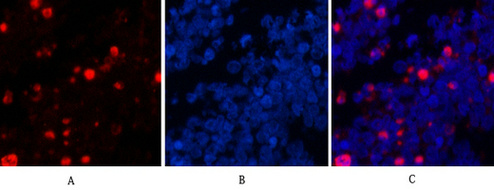
- Immunofluorescence analysis of Human-lung-cancer tissue. 1,Cleaved-Caspase-3 p17 (D175) Polyclonal Antibody(red) was diluted at 1:200(4°C,overnight). 2, Cy3 labled Secondary antibody was diluted at 1:300(room temperature, 50min).3, Picture B: DAPI(blue) 10min. Picture A:Target. Picture B: DAPI. Picture C: merge of A+B
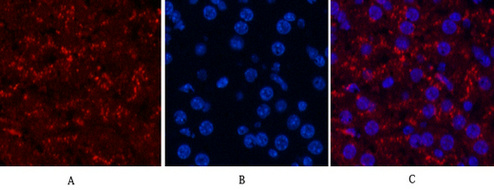
- Immunofluorescence analysis of Mouse-liver tissue. 1,Cleaved-Caspase-3 p17 (D175) Polyclonal Antibody(red) was diluted at 1:200(4°C,overnight). 2, Cy3 labled Secondary antibody was diluted at 1:300(room temperature, 50min).3, Picture B: DAPI(blue) 10min. Picture A:Target. Picture B: DAPI. Picture C: merge of A+B

- Immunofluorescence analysis of Mouse-liver tissue. 1,Cleaved-Caspase-3 p17 (D175) Polyclonal Antibody(red) was diluted at 1:200(4°C,overnight). 2, Cy3 labled Secondary antibody was diluted at 1:300(room temperature, 50min).3, Picture B: DAPI(blue) 10min. Picture A:Target. Picture B: DAPI. Picture C: merge of A+B
.jpg)
- Western Blot analysis of 293 cells using Cleaved-Caspase-3 p17 (D175) Polyclonal Antibody



